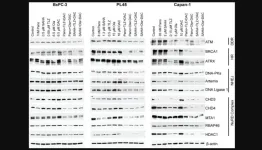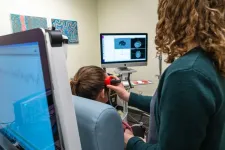(Press-News.org) BIRMINGHAM, Ala. – Preliminary clinical data for glioblastoma multiforme patients enrolled in a Phase 1 clinical trial at the University of Alabama at Birmingham demonstrated that 92 percent of evaluable patients treated with INB-200 exceeded a median progression-free survival of seven months with concomitant temozolomide chemotherapy. The median follow-up was 11.7 months.
This survival data along with radiographic improvements are indicative of positive treatment effects, which highlights the potential of IN8bio’s genetically modified, chemotherapy-resistant gamma-delta T cells as a potential first-in-class therapy for patients with newly diagnosed glioblastoma. Glioblastoma multiforme is the most aggressive type of cancer originating in the brain.
The clinical trial was led by Burt Nabors, M.D., in collaboration with IN8bio. Nabors is a professor of neurology at UAB, division director of Neuro-Oncology and a senior scientist in the O’Neal Comprehensive Cancer Center at UAB. Gamma-delta T cells are a specialized population of T cells that possess unique properties, including the ability to differentiate between healthy and diseased tissue.
IN8bio is a clinical-stage biopharmaceutical company focused on the discovery, development and commercialization of gamma-delta T cell product candidates for solid and liquid tumors. Larry Lamb, Ph.D., former professor in the UAB Marnix E. Heersink School of Medicine Department of Medicine, and the scientific co-founder and current chief scientific officer at IN8bio Inc., helped develop the technology. INB-200 is the first genetically modified gamma-delta T cell therapy to enter clinical trials. The UAB intellectual property is licensed through the Bill L. Harbert Institute for Innovation and Entrepreneurship.
The current standard of care for newly diagnosed glioma patients consists of primary resection and six weeks of daily chemoradiation therapy, followed by six cycles of monthly maintenance temozolimide therapy. This Stupp regimen achieves a median progression-free survival of seven months and an overall survival of approximately 14 to 16 months.
The Phase 1 study assessed the safety and preliminary efficacy of adding DeltEx DRI gamma-delta T cells to maintenance therapy with temozolomide. The trial assessed the administration of 10 million cells per dose across three different dosing regimens increasing from a single dose delivered on Cycle 1, Day 1 during maintenance in Cohort 1, to three doses delivered on Day 1 of Cycles 1-3 in Cohort 2, to six doses delivered on Day 1 of Cycles 1-6 in Cohort 3. Thirteen patients have been enrolled and treated with INB-200, including three patients in Cohort 1 (one dose), four patients in Cohort 2 (three doses) and six patients in Cohort 3 (six doses). All of the patients in the Phase 1 study who received all of their protocol-defined treatments with INB-200 exceeded the median progression-free survival of seven months, including one patient in Cohort 2 who remains alive and progression-free after nearly three years.
“For far too long, there has been little advancement for patients with glioblastoma multiforme to improve their treatment outcomes,” Nabors said. “The addition of multiple intracranial injections of IN8bio’s DeltEX DRI gamma-delta T cells shows the potential for extending progression-free survival in this patient population, when administered in combination with the current standard of care used to treat newly diagnosed glioblastoma patients.”
No treatment-related serious adverse events have been reported in any cohort.
“The safety profile of gamma-delta T cells continues to be strong across all three dose cohorts with no cell therapy-related toxicities such as immune effector cell-associated neurotoxicity syndrome or cytokine release syndrome reported in patients receiving up to the maximum dose of six infusions of the therapy,” said Trishna Goswami, M.D., chief medical officer for IN8bio. “We are now dosing newly diagnosed patients in Arm A of a Phase 2 study with INB-400, evaluating up to six infusions of our autologous gamma-delta T cells in combination with the Stupp protocol.”
Radiographic evaluation pre- and post-treatment included resolution of midline shift in one patient with evidence of changes in enhancement attributed to treatment effect in multiple patients. One subject was found to have a 36 percent decrease in a lesion attributed to positive treatment effect. “As these encouraging results from our ongoing INB-200 Phase 1 study continue to mature, we look forward to reporting additional results from a long-term follow-up of Cohort 3 at future medical meetings,” said William Ho, CEO and co-founder of IN8bio.
These preliminary clinical data were presented at a poster session of the 2024 American Society of Clinical Oncology, or ASCO, Annual Meeting in Chicago. Mina Lobbous, M.D., assistant professor of neurology at Cleveland Clinic (after completing his Neuro-Oncology fellowship at UAB) was the poster presenter.
END
Encouraging Phase 1 data for glioblastoma treatment reported by UAB researchers at ASCO
Ninety-two percent of evaluable patients treated with INB-200 exceeded a median progression-free survival of seven months. Glioblastoma multiforme is the most aggressive type of cancer originating in the brain.
2024-06-05
ELSE PRESS RELEASES FROM THIS DATE:
YALE NEWS: Early life experiences linked to racial disparities in cognition
2024-06-05
New Haven, Conn. — Negative early life experiences, such as attending segregated schools, contribute significantly to cognitive decline and cognition disparities between older Black and white Americans, according to a new study led by researchers at the Yale School of Public Health.
The study, published in JAMA Internal Medicine, is the first to look at the impact of school segregation upon later life cognition using a large representative sample of the U.S. population, said lead author Xi Chen, associate professor of public ...
Nationally known pediatric infectious disease researcher named vice chancellor for research at the University of Tennessee Health Science Center
2024-06-05
After an extensive national search, Jessica Snowden, MD, MS, FAAP, MHPTT, a nationally recognized pediatric infectious disease specialist and researcher, has been named the new vice chancellor for Research at the University of Tennessee Health Science Center, effective September 1. She will also serve as a professor in the College of Medicine in the Department of Pediatrics.
Currently the vice dean for Research and chief of Pediatric Infectious Diseases at the University of Arkansas for Medical Sciences (UAMS), Dr. Snowden is known as a dedicated mentor and a leader in integrating clinical, research, and academic efforts to advance the understanding ...
Synergistic cytotoxicity of HDAC and PARP inhibitors and decitabine in pancreatic cancer cells: implications for novel therapy
2024-06-05
“The results provide novel preclinical data that demonstrate synergism between HDACi- and PARPi-mediated inhibition of DNA repair and decitabine in pancreatic cancer [...]”
BUFFALO, NY- June 5, 2024 – A new research paper was published in Oncotarget's Volume 15 on June 3, 2024, entitled, “Synergistic cytotoxicity of histone deacetylase and poly-ADP ribose polymerase inhibitors and decitabine in pancreatic cancer cells: Implications for novel therapy.”
Histone deacetylase inhibitors (HDACi) can modulate the acetylation status of proteins, influencing the genomic instability exhibited by cancer cells. Poly (ADP ribose) ...
UBC-developed oral insulin drops offer relief for diabetes patients
2024-06-05
Diabetes rates continue to rise, with 11.7 million Canadians living with diabetes or pre-diabetes. At UBC, scientists have created a pain-free drug delivery method to help people with diabetes manage the disease and maintain their health more easily.
Researchers at the Li Lab have developed oral insulin drops that when placed under the tongue are quickly and efficiently absorbed by the body, potentially replacing the need for insulin injections.
The drops contain a mixture of insulin and a unique cell-penetrating peptide (CPP) developed ...
Could taking certain drugs reduce risk of ruptured brain aneurysm?
2024-06-05
EMBARGOED FOR RELEASE UNTIL 4 P.M. ET, WEDNESDAY, JUNE 5, 2024
MINNEAPOLIS – A new study suggests that people who take a few common drugs may have a decreased risk of having a bleeding stroke due to a ruptured brain aneurysm. The study is published in the June 5, 2024, online issue of Neurology®, the medical journal of the American Academy of Neurology. The results do not prove that these drugs reduce the risk of this type of aneurysm; they only show an association.
“We urgently need new ways to prevent this type of stroke, which occurs at younger ages and with a higher death rate than other types of stroke,” said study author Jos Peter Kanning, ...
Fellowships will advance reporters’ coverage of aging in America
2024-06-05
The Gerontological Society of America (GSA) has received renewed grant support to welcome a 15th class of reporters for the Journalists in Aging Fellows Program. The 2024 funders to date include Silver Century Foundation, The John A. Hartford Foundation, and National Institute for Health Care Management Foundation (NIHCM).
Since its founding in 2010, this program has been responsible for more than 800 news stories produced by 231 alumni. It has two goals: to educate journalists about issues in aging, better allowing them to spread a new awareness to general-audience, ethnic, and other minority populations; and to disseminate information about new scientific findings, ...
Study shows AI-driven cyberattacks can inflict damage on GDP and supply chains for the world’s largest economies
2024-06-05
Cyberattacks driven by Artificial Intelligence (AI) pose unprecedented risks to global economies, supply chains, and trade. A forthcoming study from the journal Risk Analysis explores the cascading impacts of AI-driven cyberattacks.
Unlike traditional cyberattacks, which are typically manual or scripted, AI-driven cyberattacks utilize AI and machine learning algorithms to enhance their effectiveness, stealthiness and adaptability. AI-driven cyberattacks can autonomously learn and evolve their tactics, techniques and procedures based on real-time feedback and environmental changes.
Through simulation scenarios, the researchers discovered the potential ...
Allison Institute announces appointment of two immunobiology experts as associate members
2024-06-05
HOUSTON ― The James P. Allison Institute at The University of Texas MD Anderson Cancer Center today announced the appointment of its newest members, Susan Bullman, Ph.D., and Xi Chen, Ph.D., to further the institute’s ongoing work of impactful immunobiology research. These accomplished researchers, joining as associate members, bring valuable expertise in studying how the intratumoral microbiome and the immune microenvironment influence patient responses to immunotherapy.
As Allison Institute members, Bullman and Chen will lead impactful research programs aligned with the institute’s ...
Focused Ultrasound Foundation designates Virginia Tech as a Center of Excellence
2024-06-05
The Focused Ultrasound Foundation has designated Virginia Tech as a Focused Ultrasound (FUS) Center of Excellence, making it the sixth such center in the United States and one of only 12 in the world.
“Virginia Tech possesses significant strengths in the FUS field, and it is an honor to recognize them as a Center of Excellence,” said Neal F. Kassell, founder and chairman of the Focused Ultrasound Foundation. “With distinguished experts across the colleges of engineering, science, veterinary medicine, and medicine, ...
US public opinion on social media is warming to nuclear energy, but concerns remain
2024-06-05
Images
The U.S. public displays more positive than negative sentiment toward nuclear energy but concerns remain about waste, cost and safety, according to an analysis of 300,000 posts on X (formerly Twitter) by University of Michigan researchers.
The study was recently published in Renewable and Sustainable Energy Reviews.
Identifying public concerns and misconceptions about nuclear energy can target efforts to bridge these gaps as nuclear energy will play a large role in goals to decarbonize ...
LAST 30 PRESS RELEASES:
Machine learning tool can predict serious transplant complications months earlier
Prevalence of over-the-counter and prescription medication use in the US
US child mental health care need, unmet needs, and difficulty accessing services
Incidental rotator cuff abnormalities on magnetic resonance imaging
Sensing local fibers in pancreatic tumors, cancer cells ‘choose’ to either grow or tolerate treatment
Barriers to mental health care leave many children behind, new data cautions
Cancer and inflammation: immunologic interplay, translational advances, and clinical strategies
Bioactive polyphenolic compounds and in vitro anti-degenerative property-based pharmacological propensities of some promising germplasms of Amaranthus hypochondriacus L.
AI-powered companionship: PolyU interfaculty scholar harnesses music and empathetic speech in robots to combat loneliness
Antarctica sits above Earth’s strongest “gravity hole.” Now we know how it got that way
Haircare products made with botanicals protects strands, adds shine
Enhanced pulmonary nodule detection and classification using artificial intelligence on LIDC-IDRI data
Using NBA, study finds that pay differences among top performers can erode cooperation
Korea University, Stanford University, and IESGA launch Water Sustainability Index to combat ESG greenwashing
Molecular glue discovery: large scale instead of lucky strike
Insulin resistance predictor highlights cancer connection
Explaining next-generation solar cells
Slippery ions create a smoother path to blue energy
Magnetic resonance imaging opens the door to better treatments for underdiagnosed atypical Parkinsonisms
National poll finds gaps in community preparedness for teen cardiac emergencies
One strategy to block both drug-resistant bacteria and influenza: new broad-spectrum infection prevention approach validated
Survey: 3 in 4 skip physical therapy homework, stunting progress
College students who spend hours on social media are more likely to be lonely – national US study
Evidence behind intermittent fasting for weight loss fails to match hype
How AI tools like DeepSeek are transforming emotional and mental health care of Chinese youth
Study finds link between sugary drinks and anxiety in young people
Scientists show how to predict world’s deadly scorpion hotspots
ASU researchers to lead AAAS panel on water insecurity in the United States
ASU professor Anne Stone to present at AAAS Conference in Phoenix on ancient origins of modern disease
Proposals for exploring viruses and skin as the next experimental quantum frontiers share US$30,000 science award
[Press-News.org] Encouraging Phase 1 data for glioblastoma treatment reported by UAB researchers at ASCONinety-two percent of evaluable patients treated with INB-200 exceeded a median progression-free survival of seven months. Glioblastoma multiforme is the most aggressive type of cancer originating in the brain.






